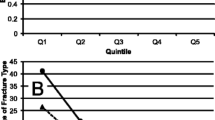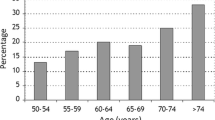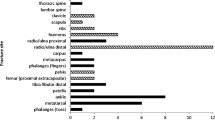Abstract
Although the utility of bone mass measurements has been the subjects of extensive investigations, the number of studies comparing the predictive value of bone mass measurement at different skeletal sites in the same cohort with a large number of clinically verified endpoints is limited. Furthermore, scant information is available on how age at the time of diagnosis influence the risk of future fractures posed by low bone mineral density (BMD). We have followed 5,564 Danish postmenopausal women for a mean period of 7.3 years. Bone mineral content (BMC) at the forearm and BMD at the spine and hip were assessed at baseline. Vertebral fractures were assessed on digitalized images of lateral X-rays of the thoracic and lumbar spine, whereas non-vertebral fractures were self-reported. At follow-up, 17.6% of the women revealed an incidental vertebral fracture and 14.2% reported a new non-vertebral fracture. The absolute risk per 1,000 person-years of osteoporotic fracture increased significantly with decreasing bone mass at all three skeletal sites (P<0.001). Osteoporotic BMD (T-score ≤−2.5) had similar predictive values of fractures regardless of the skeletal site of measurement. Furthermore, the absolute risk of osteoporotic fractures increased significantly with increasing age at the same level of bone mass. Interestingly, the relative risk (RR) of vertebral fracture accompanying 1 SD decrease in spine BMD was similar across different age groups: <55 years (RR:2.1, 95% CI 1.3–3.3), 55–64 years (RR:2.3, 95%CI 1.7–3.2), 65–74 years (RR:2.0; 95%CI 1.5–2.6). Furthermore, women with any prior osteoporotic fracture had a 2.4-fold (95% CI 2.01–2.75, P<0.001) increased risk of a new vertebral fracture. Both age and prior fracture are strong predictors of future fractures. The long-term predictive value of bone mass measurement is independent of the site of measurement and the age at diagnosis.


Similar content being viewed by others
References
Seeman E, Hopper JL, Bach LA, Cooper ME, Parkinson E, McKay J, et al (1989) Reduced bone mass in daughters of women with osteoporosis. N Engl J Med 320:554–558
Black DM, Cooper C (2000) Epidemiology of fractures and assessment of fracture risk. Clin Lab Med 20:439–453
Compston J (2004) Action plan for the prevention of osteoporotic fractures in the European Community. Osteoporos Int 15:259–262
Kanis JA, Melton LJ III, Christiansen C, Johnston CC, Khaltaev N (1994) The diagnosis of osteoporosis. J Bone Miner Res 9:1137–1141
Kanis JA, Delmas P, Burckhardt P, Cooper C, Torgerson D (1997) Guidelines for diagnosis and management of osteoporosis. The European foundation for osteoporosis and bone disease. Osteoporos Int 7:390–406
Kanis JA (2002) Diagnosis of osteoporosis and assessment of fracture risk. Lancet 359:1929–1936
World Health Organization (1998) Guidelines for preclinical evaluation and clinical trials in osteoporosis. WHO
Hui SL, Slemenda CW, Johnston CC Jr (1989) Baseline measurement of bone mass predicts fracture in white women. Ann Intern Med 111:355–361
Wasnich RD, Ross PD, Davis JW, Vogel JM (1989) A comparison of single and multi-site BMC measurements for assessment of spine fracture probability. J Nucl Med 30:1166–1171
Melton LJ III, Atkinson EJ, O’Fallon WM, Wahner HW, Riggs BL (1993) Long-term fracture prediction by bone mineral assessed at different skeletal sites. J Bone Miner Res 8:1227–1233
Cummings SR, Black DM, Nevitt MC, Browner W, Cauley J, Ensrud K, et al (1993) Bone density at various sites for prediction of hip fractures. The study of osteoporotic fractures research group. Lancet 341:72–75
Gardsell P, Johnell O, Nilsson BE, Gullberg B (1993) Predicting various fragility fractures in women by forearm bone densitometry: a follow-up study. Calcif Tissue Int 52:348–353
Nguyen T, Sambrook P, Kelly P, Jones G, Lord S, Freund J, et al (1993) Prediction of osteoporotic fractures by postural instability and bone density. BMJ 307:1111–1115
O’Neill TW, Lunt M, Silman AJ, Felsenberg D, Benevolenskaya LI, Bhalla AK, et al (2002) Relationship between bone density and incident vertebral fracture in men and women. J Bone Miner Res 17:2214–2221
Albrand G, Munoz F, Sornay–Rendu E, DuBoeuf F, Delmas PD (2003) Independent predictors of all osteoporosis-related fractures in healthy postmenopausal women: the OFELY study. Bone 32:78–85
Schuit SC, van der KM, Weel AE, De Laet CE, Burger H, Seeman E, et al (2004) Fracture incidence and association with bone mineral density in elderly men and women: the Rotterdam study. Bone 34:195–202
Kanis JA, Johnell O, Oden A, Dawson A, De Laet C, Jonsson B (2001) Ten year probabilities of osteoporotic fractures according to BMD and diagnostic thresholds. Osteoporos Int 12:989–995
Bagger YZ, Riis BJ, Alexandersen P, Tankó LB, Christiansen C (2001) Risk factor for development of osteoporosis and cardiovascular disease in postmenopausal Danish women: The PERF study. J Bone Miner Res 16:396
Borg J, Mollgaard A, Riis BJ (1995) Single X-ray absorptiometry: performance characteristics and comparison with single photon absorptiometry. Osteoporos Int 5:377–381
Marshall D, Johnell O, Wedel H (1996) Meta-analysis of how well measures of bone mineral density predict occurrence of osteoporotic fractures. BMJ 312:1254–1259
Klotzbuecher CM, Ross PD, Landsman PB, Abbott TA III, Berger M (2000) Patients with prior fractures have an increased risk of future fractures: a summary of the literature and statistical synthesis. J Bone Miner Res 15:721–739
Kanis JA, Johnell O, De Laet C, Johansson H, Oden A, Delmas P, et al (2004) A meta-analysis of previous fracture and subsequent fracture risk. Bone 35:375–382
Siris ES, Brenneman SK, Miller PD, Barrett–Connor E, Chen YT, Sherwood LM, et al (2004) Predictive value of low BMD for 1-year fracture outcomes is similar for postmenopausal women ages 50–64 and 65 and older: results from the National Osteoporosis Risk Assessment (NORA). J Bone Miner Res 19:1215–1220
Bagger YZ, Tankó LB, Alexandersen P, Ravn P, Christiansen C (2003) Alendronate has a residual effect on bone mass in postmenopausal Danish women up to 7 years after treatment withdrawal. Bone 33:301–307
Stock JL, Bell NH, Chesnut CH III, Ensrud KE, Genant HK, Harris ST, et al (1997) Increments in bone mineral density of the lumbar spine and hip and suppression of bone turnover are maintained after discontinuation of alendronate in postmenopausal women. Am J Med 103:291–297
Orr–Walker B, Wattie DJ, Evans MC, Reid IR (1997) Effects of prolonged bisphosphonate therapy and its discontinuation on bone mineral density in post-menopausal osteoporosis. Clin Endocrinol (Oxf) 46:87–92
Bagger YZ, Tanko LB, Alexandersen P, Hansen HB, Mollgaard A, Ravn P et al (2004) Two to three years of hormone replacement treatment in healthy women have long-term preventive effects on bone mass and osteoporotic fractures: the PERF study. Bone 34:728–735
Vestergaard P, Rejnmark L, Mosekilde L (2005) Osteoporosis is markedly underdiagnosed: a nationwide study from Denmark. Osteoporos Int 16:134–141
Author information
Authors and Affiliations
Corresponding author
Rights and permissions
About this article
Cite this article
Bagger, Y.Z., Tankó, L.B., Alexandersen, P. et al. The long-term predictive value of bone mineral density measurements for fracture risk is independent of the site of measurement and the age at diagnosis: results from the Prospective Epidemiological Risk Factors study. Osteoporos Int 17, 471–477 (2006). https://doi.org/10.1007/s00198-005-0009-6
Received:
Accepted:
Published:
Issue Date:
DOI: https://doi.org/10.1007/s00198-005-0009-6




